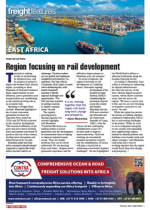Overcoming logistical and operational challenges to keep freight moving in East Africa requires strategic planning and investment in infrastructure, training and technology, according to Johan Eksteen, SGS connectivity and products manager.He told Freight News that the challenges included inefficiencies in transportation networks and infrastructure which can lead to delays and higher operational costs; navigating diverse and often complex regulatory environments which require careful compliance management; a shortage of skilled labour in certain sectors; frequent supply chain disruptions due to political instability, climate change and infrastructure deterioration; and inconsistent energy supply.Despite the challenges, SGS believes the outlook for East Africa is positive.This is due to a combination of economic diversification, infrastructure development, regional integration, a young labour force, an expanding consumer base and rapid digital transformation and innovation.With the people of East Africa already suffering from the impact of climate change, there is a strong focus on sustainability.There is an emphasis on sustainable farming practices, renewable energy (solar, wind and geothermal), eco-friendly manufacturing and waste management practices, and conservation efforts to protect biodiversity, such as wildlife conservation and reforestation projects. These initiatives attract ecotourism and international support.“Focusing on sustainability not only helps in tackling environmental challenges but also opens up new avenues for sustainable development and investment,” says Eksteen.The impact is evident in regional freight volume growth driven by factors such as economic diversification away from a reliance on agriculture, ongoing investment in transport, harbour and energy projects, a growing consumer market supported by a rising middle class and rapid urbanisation, and regional integration.Initiatives such as the African Continental Free Trade Area (AfCFTA) are promoting intraregional trade and economic cooperation.Increased foreign direct investment is supporting growth in sectors such as infrastructure, technology and manufacturing.“These factors are collectively driving volume growth and presenting numerous opportunities for businesses in the region,” he says.To support the economic growth, SGS is continuously enhancing its Pre-Export Verification of Conformity (PVoC) programmes to facilitate trade in Africa. Key developments include digital platforms and portals for more efficient and transparent processing of PVoC certificates, expanding the coverage of the programme to include a wider range of products and industries, and capacity building.“SGS is working closely with local governments and authorities to build capacity and enhance the overall effectiveness of the PVoC programmes.“These initiatives aim to streamline trade processes, reduce delays, and ensure compliance with regulatory requirements,” he says. ER

